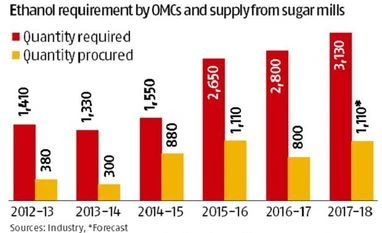Chaired by Prime Minister Narendra Modi, the CCEA approved a price of Rs 40.85 a litre for procurement season 2017-18 (beginning December 2017), up from Rs 38.97 a litre the previous season. The applicable goods and services tax (GST) of 18 per cent and transport charges would be borne by the OMCs.
"The price increase will facilitate the continued policy of the government of providing price stability and remunerative prices to ethanol suppliers. It will also help in reducing dependency on crude oil imports, saving in foreign exchange and benefits to the environment," the CCEA said.
Sugar mills said the increase would get them to supply more under the Ethanol Blended Petrol (EBP) programme. It would also mean a rise in their profitability, as ethanol is extracted from molasses, a by-product in sugar manufacturing process.
"It is a welcome step to improve profitability and increase production to meet the ambitious EBP target of three billion litres this year. In the context of a big rise in crude oil prices in the past 12 months and eight per cent in sugarcane's (minimum) price, the increment could have been slightly higher," said Narendra Murkumbi, managing director, Shree Renuka Sugars.
During crushing season 2017-18, however, mills are expected to produce 25 million tonnes of sugar, similar to 2015-16. With the same quantity of molasses available this year, the mills might achieve 1,110 mn litres of ethanol supply.
In November 2012, the CCEA approved five per cent mandatory blending of ethanol with petrol, notified in January 2013 under the Motor Spirits Act. OMCs had to record five per cent ethanol content in petrol by June 30, 2013, and 10 per cent thereafter. However, considering weak supply orders on a unremunerative price offer, OMCs managed a maximum of 1,110 million litres, equivalent to four per cent of blending, for the 2015-16 crushing season. In 2016-17, they got only 710 million litres, enough for only 2.5 per cent.
"The increase would encourage sugar mills to supply more ethanol this year," said Abinash Verma, director-general, Indian Sugar Mills Association (ISMA).
The mills were waiting for CCEA's price fixation to participate in the tender floated by OMCs. Bharat Petroleum Corporation had done so in October on behalf of the three government-owned OMCs, seeking 3,130 million (3.13 bn) litres of ethanol to achieve 10 per cent blending.
Ethanol contributes 10-15 per cent of sugar mills' annual turnover. Uttar Pradesh's mills contribute nearly half the country's ethanol supply.
"We don't purchase molasses from the market. It is a byproduct of sugar manufacturing. Hence, we incur no extra cost on the raw material. Therefore, higher realisation from ethanol would add to the company's profit," said Vivek Saraogi, managing director, Balrampur Chini Mills.
Sugar stocks reacted positively to the CCEA decision. The share price of Gayatri Sugars jumped 12 per cent to trade at Rs 11.20 on the BSE on Tuesday. Those of Shree Renuka Sugars, Bajaj Hindusthan and Simbhaoli Sugars rose 7.3 per cent, 3.3 per cent and 2.47 per cent.
To read the full story, Subscribe Now at just Rs 249 a month
Already a subscriber? Log in
Subscribe To BS Premium
₹249
Renews automatically
₹1699₹1999
Opt for auto renewal and save Rs. 300 Renews automatically
₹1999
What you get on BS Premium?
-
Unlock 30+ premium stories daily hand-picked by our editors, across devices on browser and app.
-
Pick your 5 favourite companies, get a daily email with all news updates on them.
Full access to our intuitive epaper - clip, save, share articles from any device; newspaper archives from 2006.
Preferential invites to Business Standard events.
Curated newsletters on markets, personal finance, policy & politics, start-ups, technology, and more.
Need More Information - write to us at assist@bsmail.in
)